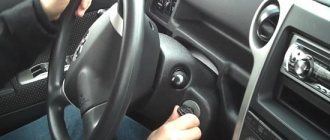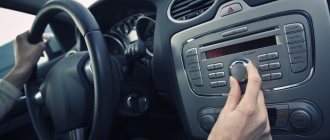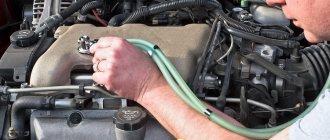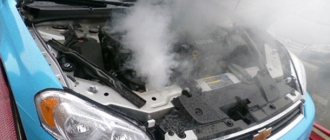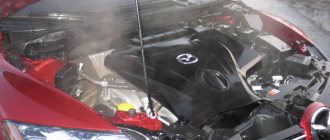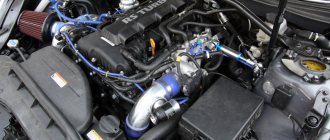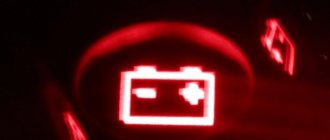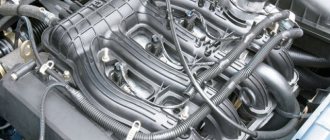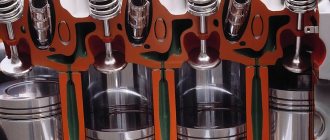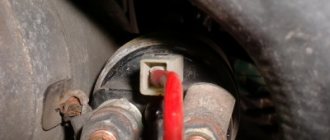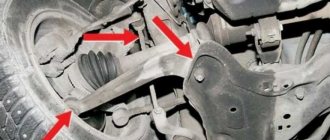The sooner you eliminate it, the better. After all, most faults can cause a chain reaction. And provoke breakdowns of other engine components. Therefore, always listen carefully to the operation of the power unit.
Causes of malfunction
Before we begin to study the causes of the malfunction, we remind you that hereinafter we are talking about the crackling noise of the starter, which is most similar to the loud rattling of the contacts of an electromagnetic relay. If you hear an unpleasant metallic grinding noise from under the hood, then it appears due to poor engagement of the overrunning clutch (starter Bendix) with the flywheel teeth - that’s a completely different story.
Most often, the starter crackles when you turn the ignition key for three reasons:
Low battery
To understand the cause of the crackling noise due to a discharged battery, let's remember the starter device. When you turn the ignition key, the voltage from the on-board network is supplied to the coil of its solenoid relay. The electromagnetic forces that appear in this case cause the armature of the device to move. It closes the power contacts that connect the starter motor to the battery, and in addition, causes the Bendix gear to engage with the flywheel.
When the battery is discharged, its energy may be enough to attract the metal core - cranking the crankshaft is out of the question. As soon as the starter contacts close and power is supplied to its electric motor, the voltage drops to such an extent that the electromagnet is unable to hold the metal core. Under the action of the return spring, it tends to take its original position and opens the power contacts. The restored voltage contributes to the repeated retraction of the anchor, and the situation is recreated many times.
To make sure that the culprit of the problem is a deep discharge of the battery, just turn on several consumers (lighting, electric heater motor, etc.) and press the sound signal. The latter will either not turn on at all, or will be heard with wheezing, reduced amplitude or attenuation.
Poor engine ground contact
The picture of what is happening is practically indistinguishable from the case discussed above, with the only difference that the test for battery discharge ends with a negative result - all consumers, including the sound signal, are working at full strength.
At the same time, it is very simple to determine that the cause of the malfunction is poor contact between the battery and the engine - just pay attention to the oil pressure warning lamp, which is located on the instrument panel. If the voltage in the car’s on-board network is below normal, then turning the ignition switch to the “Start” position will lead to a gradual attenuation of the brightness of the warning lamp (like all others).
In the case where the cause of the crackling sound of the starter solenoid relay is a bad ground, an attempt to start the engine will lead to its complete extinction in time with the clicks of the solenoid relay. At the same time, other indicators practically do not change the intensity of the glow.
Everything is explained very simply - the “mass” of the oil pressure sensor, as well as the starter, is the housing. Therefore, as soon as the electrical contact between the engine and the battery is lost, both of these devices stop working synchronously.
Open or shorted starter relay winding
Another reason why the solenoid relay cracks is an interturn short circuit or a break in its holding winding. In other words, the efforts of the electromagnet become insufficient to keep the power contacts of the starter relay in the closed state and engage the overrunning clutch gear with the flywheel ring gear. Under the action of the return spring, the bendix tends to take its original position, and the contact pad located on the armature opens the electrical connection. After this, the retractor winding turns on again and the situation repeats itself many times, which causes the crackling noise.
to determine that in this case the starter solenoid relay has failed by the behavior of the warning lamps located on the instrument panel. At the moment when the loud clicks of the starter are heard, their brightness does not change - the switching of the starter motor occurs for such a short time that the battery voltage practically does not drop.
Something else useful for you:
- The starter does not turn the retractor, but clicks
- How to check the starter solenoid relay?
- Why doesn't the car start, but the starter turns?
It won't start, it rattles...
The car suddenly refused to start... I left it for the whole day, came back, all the lights were on, the starter was crackling, as if the battery had died completely. I checked the light - it burns brightly, the far one is brighter than the near one...
The car is a 2001 Honda Civic. Hatch. Does anyone know what could be happening??
the sound of a crack is hard to hear, it’s not clear
